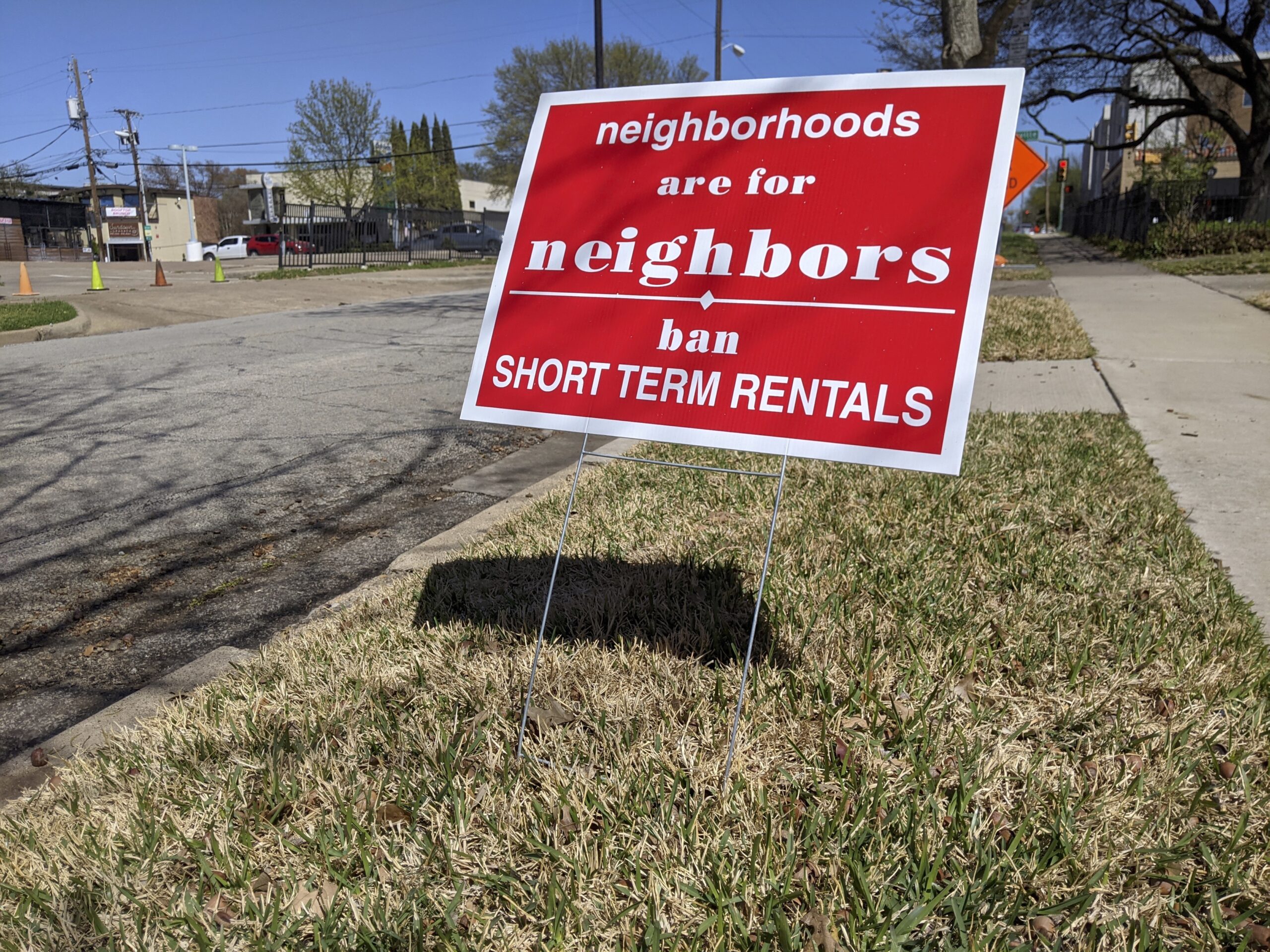The City Council next month will learn about an ordinance that will ban short-term rentals in residential neighborhoods in Dallas.
A recommendation from the City Plan Commission would push Airbnbs, Vrbos, and other platforms out of single-family zoning, where, city staffers say, about 95 percent of the registered stock in Dallas currently operate. By a count of 9-4, plan commissioners in December voted to recommend redefining these properties as “lodging uses,” which makes them illegal in residential communities.
The city of Dallas has been mulling over this matter since 2020. There have been three task forces, dozens of community meetings, a study, and the plan commission’s recommendation. Now, it will be up to the City Council, which appears poised to vote before the May election.
It has been contentious. Those who want short-term rentals out of residential neighborhoods cite quality-of-life and safety concerns, juiced by large parties, high-profile shootings, and what police described as a brothel. They consider these 30-days-or-fewer rentals to be businesses that, under existing city code, are operating illegally in single-family neighborhoods.
Those who speak in support of these rentals believe zoning to be too blunt of an instrument. Instead, they say, pick up the scalpel. Hike registration fees to pay for more code enforcement to cut down on nuisance houses and crime while generating more hotel tax revenue for the city and allowing property owners to have another revenue stream.
The Quality of Life Committee was briefed on the plan this week. The body immediately went into executive session after the briefing and punted questions until the full Council hears the details on April 4. So we don’t know exactly where all of the Council falls on this. But five members requested the vote in April: Paul Ridley, in downtown, Uptown, and East Dallas; Carolyn King Arnold, in South Oak Cliff; Omar Narvaez, in West Dallas; Cara Mendelsohn, in Far North Dallas; and Gay Donnell Willis, in Preston Hollow.
One thing is clear: Dallas has missed out on a significant bit of money. City Hall didn’t start collecting hotel taxes on these properties until 2019. The contractor in charge of registering these properties and collecting their taxes reports that there are 1,735 properly registered and active—and about 1,200 “possible” locations that aren’t registered and aren’t paying any hotel tax. Other third-party databases show more than 6,000 operating in the city, a number the anti-folks believe is more accurate.
Just 48 of those would be allowed to operate if the Council follows the plan commission’s recommendations.
Like rideshare and scooters and other new technology, Dallas didn’t have any sort of regulations or enforcement mechanisms in place once folks started listing their homes for nights and weekends on Airbnb and Vrbo. They are not subject to city inspection, because they don’t currently have to be registered with the city’s rental home registration program. Code doesn’t work after dark or on Saturdays and Sundays, and the police department doesn’t have the bodies to prioritize breaking up a house party.
That means zoning them out will also require enforcement. If Council approves zoning Airbnb out of neighborhoods, the city says it will need to spend $1.4 million on hiring seven code officers, a supervisor, and an administrator.
If Council chooses to reject the ordinance, the city would need to spend $2.3 million on 16 new code employees, vehicles, and the same software. It anticipates generating a little under $1 million in revenue from the registration and inspection fees, not counting the hotel tax.
“It’s a commercial use. It’s a lodging use, it’s classified as such by the state tax code, and commercial uses don’t belong in residential zoning,” says Ridley, whose District 14 has more short-term rentals than any other council district. That’s also where most of the organizing against has originated, which I explored in a column in the March issue of D. “It has created a situation where long-term residents no longer know who lives in houses in their neighborhood. It’s affecting the fabric of the neighborhood in a way that is not conducive to safe neighborhoods, frankly.”
Fort Worth last month zoned short-term rentals out of single-family neighborhoods. Arlington pushed them out of residential communities in 2019 and allowed them only in a defined “entertainment zone” near Six Flags, AT&T Stadium, and Globe Life Field. Arlington, in fact, is the genus for using zoning to rid neighborhoods of short-term rentals. The Texas Neighborhood Coalition started there and now has chapters in more than a dozen cities.
Retired attorney David Schwarte helped found the organization. Part of his municipal proselytizing involves arguing that cities do have the right to control short-term rentals by way of zoning.
“Under the Texas Local Government Code, the cities have been given the power to decide what districts you have and how the land may be used,” he said. “The cities are perfectly free to set aside land use as single-family residential.”
He believes zoning is actually the least messy way to do this. The U.S. Court of Appeals blocked New Orleans’ plan to not issue licenses to out-of-state investors, which that city tried to do so it could limit who had the right to rent out homes. Grapevine was sued after an outright ban, which the Council tied to a 1982 ordinance that blocked bed and breakfasts. Austin ran into legal trouble after permitting short-term rentals and then reneging. Schwarte sees Dallas as free to make its zoning change. In that case, the Texas Supreme Court sided with the short-term rental operators.
The legal morass is likely why the Quality of Life Committee spent over an hour in executive session earlier this week, speaking with city attorneys. Hanging over all of this are two bills snaking through the Texas Legislature. House Bill 2665, filed by suburban Houston state Rep. Gary Gates, would effectively block cities from requiring registration or regulations of short-term rentals. House Bill 2367, filed by Republican state Rep. J.M. Lozano from Kingsville, would block cities from regulating how short-term rentals are used. Those could wipe away whatever Dallas winds up doing.
“I don’t think we should live in fear of what the state legislature might or might not do and fail to legislate appropriately for the benefit of our own residents,” Ridley said.
The Council will have to navigate what it feels is right. The suggestion in front of it would effectively ban short-term rentals where they are currently operating. The city spent months researching this issue in a study, which produced data that counteract some of the concerns from the folks who want these out of residential neighborhoods: 88 percent of them haven’t had a 311 or 911 call, they represent less than 1 percent of the city’s housing stock, and only 5.9 percent of owners operate more than one. The report declares that “there is no evidence in the data that STRs have a city-wide impact.”
“Nobody wants to live next to a party house,” says Lisa Sievers, an Airbnb operator who served on the three task forces. “What we should be doing is trying to shut down the people who are the bad actors and allowing the rest of us to continue to operate our businesses.”
Supporters view them as assets that allow tourists and out-of-town workers to experience a part of town they may not otherwise visit. David Noguera, the city’s director of Housing and Neighborhood Revitalization, told the plan commission that he believes short-term rentals are an important piece of the city’s housing mix. They can serve as a bridge for future Dallasites who are looking for a more permanent place to live.
This is what the City Council will have to unfurl. The full body will be briefed on April 4, and the vote is expected the following week. Council elections are on May 6: homeowners are the most desired voters in the city’s historically awful turnout.
Get the D Brief Newsletter
Author





